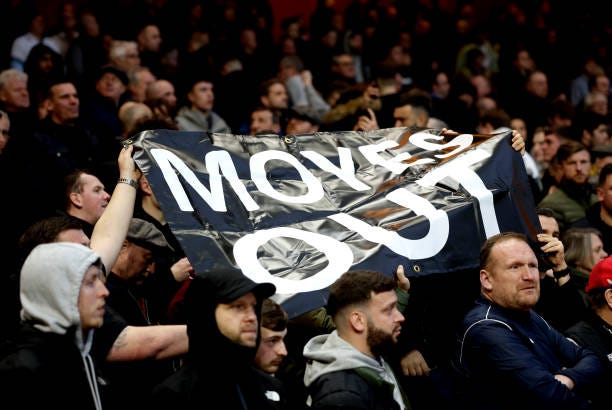Now is not the time to change the manager: the case for keeping Kemi
Reform’s destructive radicalism or the fragmented left’s anti-growth progressivism represent a terrible choice. Another bout of Tories ripping into each other would bring that awful choice nearer.
Nearly every football fan knows the feeling. One season flying high, scrapping for the league championship, winning cups and giving those fans what they want and love: victory. And then it all changes, a run of poor results and the side is in a basement battle to stave off relegation. Every game is a finger-chewing spectacle characterised by stress not joy. And even if calamity is averted the fans’ pleasure is pyrrhic because they’re sure that come the new season the pain will start up again. Something needs to be done, those fans shout at the owners. We need a new goalkeeper. Or a striker. Or something. Most usually that something is a new manager, a new boss for the team. Voices will be heard saying ‘he’s lost the dressing room’ or ‘the players aren't up for a battle’; a host of euphemisms, metaphors and angry analyses pour out with each one concluding that a new boss, new leadership is what’s needed:
“Kemi supporters would doubtless say this is a situation beyond her control, but I’m sad to report that the defection of voters from Tory to Reform, and the loss of chief opposition status, corresponds almost exactly to her election as leader.”
It is probably best to put the football manager allusion to bed and to talk about the Conservative Party. The quote above is from an opinion piece from Telegraph columnist, Tim Stanley, who argues that the failure of the Party to bounce back from the disastrous result in July 2024 is down to the failure of the manager Tories chose to replace the hapless Rishi Sunak: Kemi Badenoch. Stanley’s view is that the Conservatives should dump Badenoch in favour of the man they rejected less than a year ago, Robert Jenrick.
“Contrast with Jenrick, who by confronting fare dodgers acted not only as if he is the leader of the opposition but the current prime minister, by-passing bureaucracy to enforce the law and change the culture one TikTok at a time. Rob spent his holidays hanging flags from lampposts – chasing and hoisting the zeitgeist – and it won’t be long before he poses in the nude, wrapped tastefully in the colours of St George.”
The problem as I see it here isn’t that, as Stanley makes clear, Reform UK represents the big threat to the Conservatives but that the ‘wrap the flag round you’ solution he proposes seems a mistaken tactic. After all Reform is rather better at being Reform than the Conservatives and even then the current ‘zeitgeist’ is one of a minority facing up to a fractured opposition. To appreciate why Reform’s apparent success is somewhat illusory, we should look at public opinion on immigration and ask why Reform, the party with the most robust policies on migration, cannot better 32% in opinion polling when three-quarters of the public are with them on this issue?
Because of the British electoral system, Reform’s current polling flatters them because support is spread across five (six in Scotland and Wales) political parties. A number that may increase by one if Jeremy Corbyn and Zara Sultana ever actually launch their far left islamist party. The the limits of Reform’s base will show when, after next year's Welsh Senedd elections, Reform is the biggest party but Wales gets a more left wing government than the one it has today; a coalition between Labour and Plaid Cymru. Plus, of course, the Reform ‘surge’ in Scotland absolutely assures that the separatist SNP will remain solidly in power north of the border. And English metropolitan local councils will be even more ungovernable than they are today.
Unless Labour MPs completely lose their minds then the next general election won’t be until the Summer of 2029 (I appreciate here that some believe Labour MPs collectively lost their minds a long while back) four years from now. To return to our football metaphor, the last games for the embattled Tory Party are a long time away and a great deal can change in that time. Kemi Badenoch’s strategy of preparing for that general election rather than next week’s opinion polling doesn’t seem to be a mistaken strategy. And if there is criticism it should be of whether the things Badenoch is doing amount to the right preparation rather than crying about how Reform is making the political weather.
There are some commentators who, like the Grand Old Duke of York, think politics is all about charging about the land seeking to do battle only to end up marching back again having failed to find the enemy. Those like Tory councillor and writer, Tom Jones:
“...but ten months is ten months, and a full campaigning season is behind us. How much ground have we taken…”
If we switch the time for wars in Flanders and move from that grand old duke to the muddy trenches of 1914-18 we can see where the Jones - and many others - mindset comes from. But the Conservatives aren’t fighting early 20th century trench warfare but a war on two fronts against two different enemies. Made worse by a portion of the army thinking that one of those enemies is, or should be, a friend. After all we shared the battle with what is now Reform during the Brexit battles, surely the battle against Starmer’s progressive hordes is also one we share?
Forget this nonsense. Reform’s aim, stated again and again, is to destroy the Conservative Party because it knows in its heart that only through such destruction - the elimination of the conservative idea from British politics - can the radical right win power. It is for this reason, tactics not conviction, that Nigel Farage and his advisors have been so brutal in excluding the most overtly racist elements of his nationalist coalition. Reform is happy to surf the ethno-nationalist wave fuelled by the likes of Rupert Lowe and Matt Goodwin but wants a sufficient distance from the worst sort of ‘England for the English’ polemic. Whether this can survive the breakdown of order remains to be seen but most people are appalled by two men shouting ‘raghead’ at an Asian woman while daubing red St George’s crosses onto a row of shops.
I don’t know what’s right for the Tory Party but I am sure that the very worst option is to defenestrate another leader. Although the Conservative Party and I drifted apart because it chose Boris Johnson as leader, it is plain to me that the party lost its way when instead of lining up behind a leader faced with daily attacks from the enemy, it chose instead to facilitate that leader’s resignation. In Tim Stanley’s article he says this is still the Tory Party’s default:
“...the plot to remove Kemi is said to be advancing, and there are whispers of a timetable. Conference is expected to be do-or-die for Kemi, just as it was for Truss in 2022”
Regardless of the outcome, if this is what the Party does at its conference then it truly deserves to die. One of the lessons from teams that avoid relegation is that they are evidently a team and that, despite limitations and weaknesses, work together to live and fight another season. Maybe there is somewhere a David Moyes available to pull the blues out of the mire but, though Robert Jenrick is a likeable and effective campaigner, I don’t think he fits that bill. When Kemi Bademoch became leader, her first act was to not fumble the hospital pass from Rishi Sunak and to get the efforts of effective campaigners like Jenrick, Karie Lam and Robbie Moore directed at Labour’s failings rather than, as Stanley and Jones seem to prefer, having them machine-gunning the leader’s camp.
The task ahead is hard and, so far, there’s not been a single blow landed on Reform. Probing that party’s weaknesses will be the test of the next twelve months and replacing Badenoch with a leader who sounds like Reform but isn’t Reform seems the worst way to get to that task. The tasks include challenging Reform’s links with the ethno-nationalist right, stemming the drip of defections (likely to increase as opportunistic councillors decide their chances are better with Reform), and exposing the shallowness of Reform’s policy platform. All while, once parliament is back, continuing to hold Labour’s feet to the fire and demonstrating that Farage is only going to use parliament to grandstand not to challenge Labour’s failures.
Kemi Badenoch may fail in these tasks but it doesn’t seem to me that she has failed in the last ten months. Don’t take this as a glowing endorsement since I wouldn’t have voted for her had I still been a party member, but I really think replacing Badenoch now is the worst possible strategy and would simply remind the public that the Conservative Party is divided and fractious. For me what matters is that the conservative idea as carved in Britain by Disraeli, Baldwin and Thatcher remains as an offer to the people. I fear that Reform’s destructive radicalism and the fragmented left’s anti-growth progressivism represent a terrible future for our nation if that’s all the choices faced by voters. Another bout of Tories ripping into each other would bring that awful choice nearer.




Looking at the chart on polling, I think the rise of Reform to become the larger opposition has more to do with the decline of Labour than the Conservatives.
Since the election, Reform are +16, Conservatives are -6 and Labour are -15. And my guess is that there has been some shift from Con to Ref because of that "largest party effect" that tactical voters will shift.
The real problem isn't the leader. It's 20 years of Conservatives continuing New Labour, to the point where people who were right-ish stopped seeing a reason to support them. Foreign aid, high speed rail, net zero which no-one wanted, but the things they did want (improving law and order, lowering immigration, lowering waste, reforming public services) didn't happen.
You don't just instantly get trust back after disappointing a large chunk of your natural support.
It's policy, not personality. The smart move for the Conservatives would be to position themselves as hardline on migration and ready and willing to stop the demographic and cultural shift to which most people are opposed, but do it in a humane fashion. Although 26% of Brits now support remigration, 52% are opposed to it. If anything that figure will get worse as mass migration continues.
You really need to read Social Identity Theory (Tajfel and Turner). Ingroup cannot really be changed through experience or education. It's pretty much fixed in childhood, and to a lesser extent the teen years. Essentially, it's homophily, the love and preference for one's own culture.
Niall Ferguson looked back at American history. Populism emerged four times for two reasons: the rate of foreign-born citizens rose above 14% and there was a major economic downturn. The talk was called 'A Recipe for Populism' and it was at Google Zeitgeist.
It's not race, it's culture.
The other issue is economics. High per capita growth periods are characterised by tight labour markets. It's switching behaviour. With easily available low cost labour businesses focus on expansion. With tighter labour markets they spend a larger portion of their revenue on capital investments to increase productivity, as well as investing in people. It might seem that this wouldn't apply to service industries like hospitality, but a £20 K+ oven will significantly increase the labour value and PM derived from each chef in a kitchen. This is not my view, but that of Nobel prize winning economist Angus Deaton.